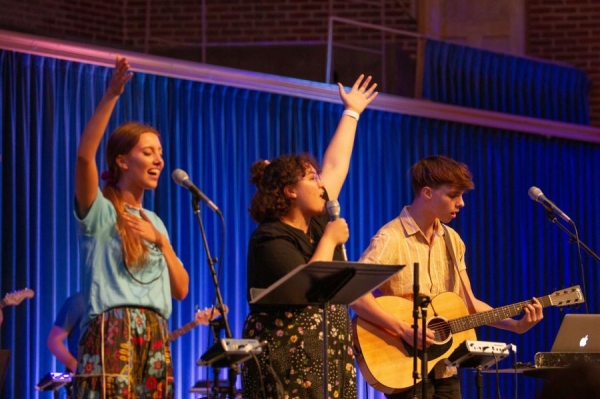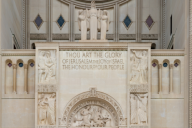You have /5 articles left.
Sign up for a free account or log in.

Janay Garrick, who formerly taught at Moody Bible Institute, is in the midst of a lawsuit against the college.
Janay Garrick
A federal appeals court recently ruled that Janay Garrick, a former instructor at Moody Bible Institute, can move forward with a sex discrimination lawsuit against the evangelical college in Chicago.
Moody Bible Institute claims to have fired Janay Garrick, a communications instructor, in 2017 for vocally disagreeing with the institution’s doctrinal belief that women shouldn’t serve in certain church ministry roles. The institution’s lawyers argued to the U.S. Circuit Court of Appeals for the 7th Circuit that her case should be dismissed based on religious autonomy doctrine, the legal principle that government can’t meddle in the religious governance of faith-based institutions.
Garrick’s lawyers, however, asserted that Moody officials were aware of her views when they hired her and merely asked her to remove that she was an “ordained minister” from her résumé and sign a doctrinal statement affirming she agreed with the institution’s religious views. They argued the institution denied her opportunities available to her male colleagues, subjected her to a hostile work environment and ultimately fired her because of her gender, not her offbeat doctrine, according to a brief filed last year by Americans United for Separation of Church and State, a firm representing Garrick. (Garrick declined an interview and referred Inside Higher Ed to her lawyers.)
“Janay Garrick was fired because she tried to combat rampant sex discrimination at the college,” Rachel Laser, president and CEO of Americans United, said in a press release after the decision. “Our courts should not allow religious freedom to be distorted as a license to discriminate against women and deny them basic civil rights.”
The appeals court ruling noted a district court threw out Garrick’s initial complaint filed in 2018 because it tied her termination to her doctrinal differences with the institution, but it allowed the amended complaint, focused on gender discrimination, to move forward, a decision the appeals court upheld in March, despite Moody’s protests.
Daniel Blomberg, vice president and senior counsel at the Becket Fund, which specializes in religious liberty cases and represents Moody, said “Moody remains confident that they will ultimately prevail on the case. The principles of church autonomy and separation of church and state clearly weigh in its favor, and the facts of this particular situation.”
Bradley Girard, litigation counsel for Americans United and lead lawyer on the case, said the appeals court reaffirmed that “just because a defendant is a religious institution, or claims some religious reason for what it does, doesn’t mean that it doesn’t have to follow the same rules as everybody else and how litigation proceeds.”
Garrick, who began teaching at Moody in 2014, claimed she was denied accommodations afforded to male colleagues, such as a reduced teaching load while pursuing a terminal degree, and her application to be promoted to assistant professor was denied within an hour of receipt, according to the brief from Americans United. She also alleged she was ignored, talked down to and “ridiculed” by male colleagues, and she was also the only one reprimanded when she and her male counterparts called attention to sex discrimination at Moody. When she complained of her treatment in 2016, she was reportedly told to buy a printer for her office and avoid shared work spaces. The brief also argues other women faced discriminatory treatment. For example, Garrick helped a student file a Title IX complaint after the student was denied admission to the pastoral ministry program.
Garrick reported receiving multiple positive performance reviews followed by a negative evaluation in short succession, based on peer reviews, which male colleagues didn’t have to undergo. When she questioned the negative review, Moody officials allegedly pointed to her outspoken perspective on women serving as ministers and fired her later that month.
Blomberg said, as far as he’s concerned, Garrick admitted “that Moody held a sincere religious belief, that it required all of its employees to hold that sincere religious belief, that she in fact advocated against those beliefs on campus and that Moody terminated her for that reason.”
“All of those facts together are enough to trigger the religious autonomy doctrine and keep the courts out of interfering in Moody’s internal decisions,” he said.
Girard said any employer accused of discrimination would argue they penalized the employee for legal reasons, and just like Moody has a right to make that argument, Garrick also has the right to “prove her case.”
He argued that Moody officials haven’t said Garrick’s heavier teaching load, the promotion denial despite “rave reviews” and her ignored complaints about sexist treatment were “religiously based.”
“What Moody has said is don’t pay attention to those—there’s other stuff that we’re saying matters,” he said.
The Bigger Picture
The appeals court itself was divided on the matter, despite its ultimate conclusion.
“No court has ever held that the First Amendment doctrine of church autonomy establishes a constitutional right to immunity from trial in cases where non-ministerial employees allege non-religious discrimination,” wrote Circuit Judge Amy St. Eve, outlining the majority opinion of the three-judge panel.
Circuit Judge Michael B. Brennan issued a dissenting opinion arguing that the case was too tied to doctrinal issues for a court to take up the matter.

Becket Fund
“This employment litigation between a teacher and a school concerns claims and defenses tethered to religious beliefs” and “questions about religious education are protected by church autonomy,” Brennan wrote.
Charles Russo, Joseph Panzer Chair in Education and research professor of law at the University of Dayton, a Catholic institution in Ohio, said this isn’t the first time faith-based education institutions have been embroiled in similar legal battles.
He highlighted a legal principle called “ministerial exception,” which prohibits government from interfering in the hiring and firing of church ministers in particular. But “minister” has been broadly interpreted in many cases. For example, a Utah District Court opinion sided with Brigham Young University in 2022 when a trainer in its Missionary Training Center was fired after getting a “masculine” haircut. A 2020 U.S. Supreme Court case famously ruled that the ministerial exception applied to two elementary school teachers at their respective Catholic schools, one who alleged age discrimination and another who claimed she was fired for seeking medical leave.
“On paper, the ministerial exception sounds great … I generally support it,” Russo said. “But I think there are times when employers have gone too far in asserting that defense.”
He believes Garrick, on the face of it, makes a “pretty good case” that her discrimination complaints fall outside of doctrinal issues and are related to her gender.
Blomberg said whether or not an employee has a religious role shouldn’t make a difference. He compared Garrick’s case to a scenario in which a janitor at a Jewish K-12 school wore a shirt with “anti-Jewish sentiments”
“If our janitor is wearing a shirt that is against our identity and mission as a Jewish organization, then we would have the right to terminate that employee,” he said. “There’s a similar principle at stake here where you have an employee of a religious group, regardless of whether they’re a leader of that religious group, openly advocating against the religious beliefs that bind that community together.”
Girard acknowledged the law has “certain exemptions for religion,” for example, a Catholic university can choose to only employ Catholic professors without being vulnerable to antidiscrimination lawsuits.
But overall, “what the courts have said, and they said over and over again, is that it doesn’t go further than that … If anybody with a religious objection to a law gets to just not follow that law, that would be, as one case says, ‘courting anarchy,’” he said, referring to a 1990 U.S. Supreme Court case about ritual peyote.
As the case moves forward, it could have broader implications for religiously affiliated colleges and universities.
“Courts look for persuasive precedent,” Russo said. “And I think it does have the opportunity to reach out much further.”
Blomberg said the appeals court’s decision already raises “a number of problems that will jeopardize the ability for religious groups to manage their internal affairs without government interference.”
“The process of litigation alone can inflict enough intrusion and entanglement and harm to constitutional rights that it puts a lot of pressure on religious groups to settle before they ever get their full day in court,” he said. “… Moody is confident that the case will ultimately be resolved favorably. But unfortunately, in the meantime, it's going to face more and irreversible harm to its First Amendment rights than should be necessary in a case like this.”
Girard said the appeals court ruling just “reaffirms what courts have said for decades now” and allows employees at religious universities to have their say in court.
“I am happy that the Seventh Circuit decided, along with every court to consider the issue recently, that religious institutions have to follow the procedures the same way that every other party in the case does,” he said. “That, I think, is really important.”









